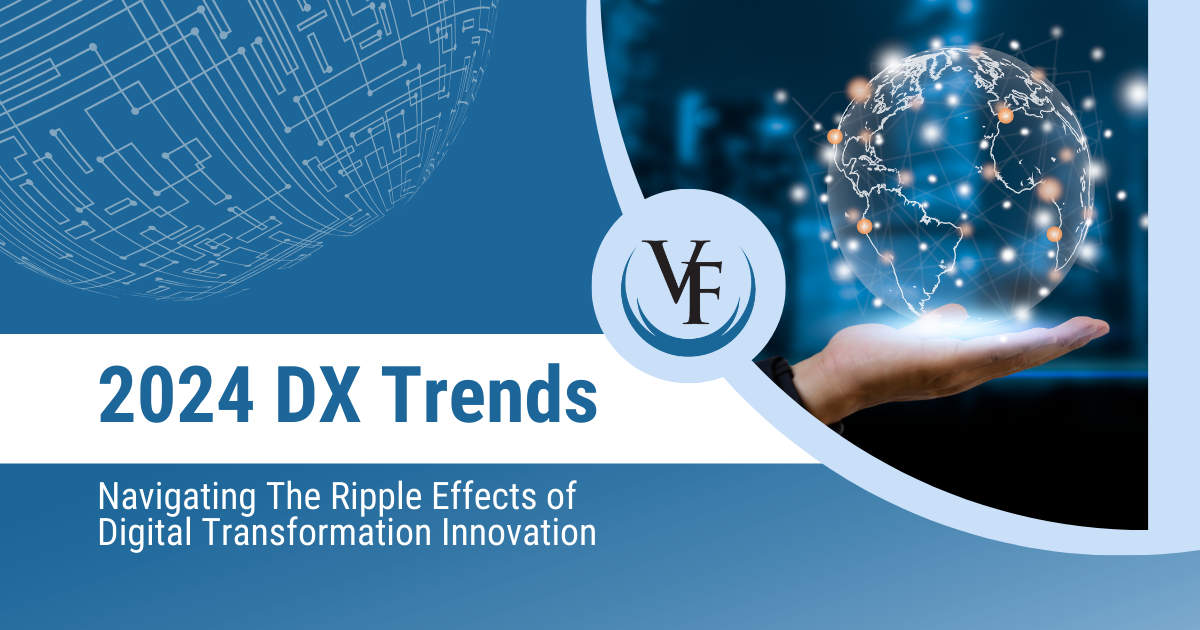
2024 DX Trends: Navigating The Ripple Effects of Digital Transformation Innovation
2023 was a year that brought numerous technological breakthroughs, groundbreaking innovations, and shifts in the global business world whose impacts will continue to ripple through 2024 and beyond. In the dynamic landscape of 2024, the need to navigate digital transformation (DX) has never been more pressing. As we stand at the intersection of technological innovation and business evolution, understanding the nuanced implications of these breakthroughs becomes paramount.
This article aims to shed light on the implications of DX for various industries in 2024. It will delve into the technological innovations driving this change and their application across different sectors. While the focus will be broad, touching upon various industries, specific emphasis will be placed on logistics, manufacturing, and production management, given their critical role in shaping the global economy.
Furthermore, the article will explore the challenges organizations face in this journey, including issues related to cybersecurity, the digital skills gap, and the ethical use of technology. Lastly, it will offer a glimpse into the future, predicting the long-term impact of these changes on the global economic landscape and society at large. Join us on a journey through the driving forces of digital transformation. Explore the biggest technological trends of 2023 and what to expect in 2024 as we look to the future, seeking to understand the intricacies of digital transformation and its far-reaching impact on both commerce and society.
Table of Contents
Digital Transformation: A Monumental Shift
In business and technology, digital transformation (DX) represents a monumental shift in how organizations operate and deliver value to customers. It’s a comprehensive process integrating digital technology into all business areas, fundamentally changing how they work and how value is delivered to customers. More than just a technological upgrade, true digital transformation involves a radical rethinking of how an organization uses technology, people, and processes to change business performance.
This transformation is driven by the rapid evolution of digital technologies, which are altering the fabric of various industries from manufacturing, retail, services and more. It encompasses a wide range of activities, from automating processes to overhauling entire business models. In 2024, the scope of DX is vast, including the adoption of emerging technologies like artificial intelligence (AI), the Internet of Things (IoT), cloud computing, and advanced data analytics.
The concept of DX is not just about technology but also about the cultural change that it necessitates. It challenges traditional norms and encourages organizations to pursue continuous improvement, become more agile in their process execution, and blend the physical and digital worlds effectively.
Key Drivers of Digital Transformation in 2024
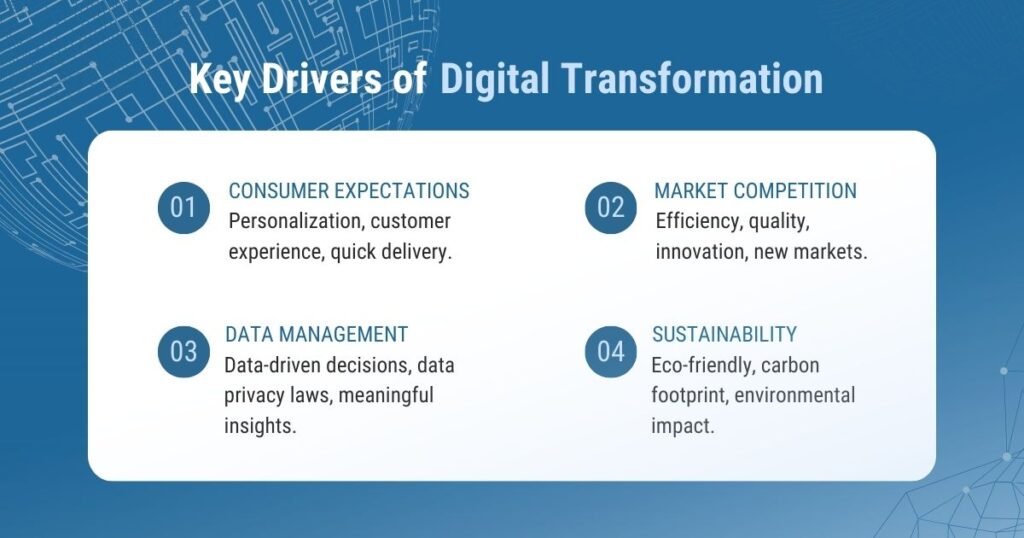
Several factors are propelling digital transformation forward in 2024. Consumer expectations are at the forefront, with a growing demand for personalized, seamless experiences driving businesses to innovate digitally. Market competition is another critical driver, with companies striving to leverage digital tools to gain a competitive edge, improve operational efficiency, and enter new markets.
Moreover, the increasing volume and accessibility of data is a significant catalyst. The ability to harness big data and derive meaningful insights is revolutionizing decision-making processes. Additionally, regulatory and environmental factors are influencing digital strategies as businesses seek to comply with data protection laws and adopt sustainable practices.
In summary, DX in 2024 is a multifaceted phenomenon driven by technological advancements and shaped by a myriad of internal and external factors. It represents a fundamental shift in the way businesses operate, offering new opportunities for growth, innovation, and competitive advantage.
Technological Innovations and Their Applications
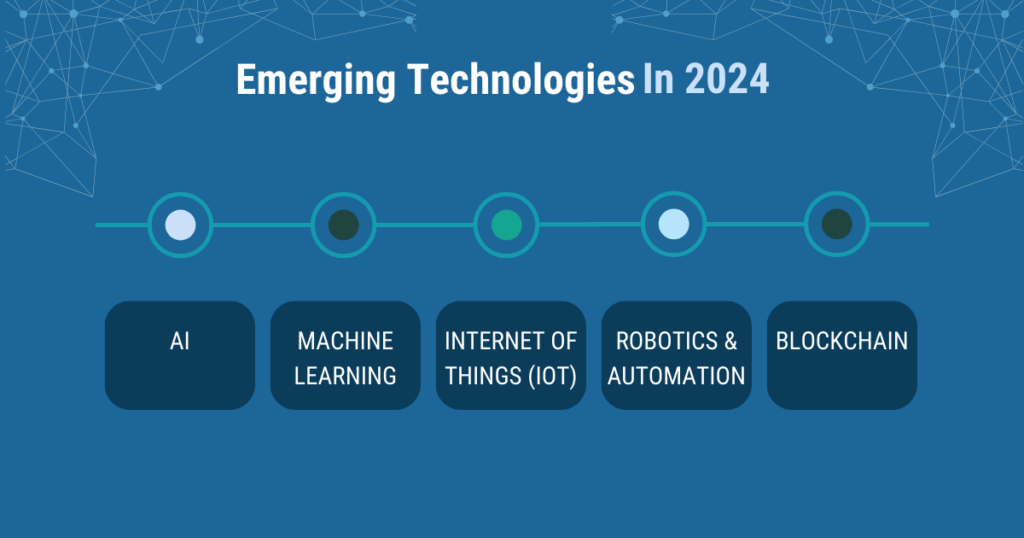
The landscape of technology in 2024 is marked by several groundbreaking innovations. These technologies are not just enhancing existing processes but are creating new possibilities and opportunities across industries. Key among these are advancements in artificial intelligence (AI), machine learning, the Internet of Things (IoT), blockchain technology, and quantum computing.
AI and machine learning continue to evolve, offering sophisticated capabilities in pattern recognition, predictive analytics, and autonomous decision-making. IoT technology is connecting an ever-expanding array of devices and systems, providing unprecedented levels of data and insights. Blockchain is emerging as a powerful tool for secure, transparent transactions and data management. Meanwhile, quantum computing is beginning to offer solutions to complex computational problems that were previously unsolvable, opening new frontiers in various fields.
These technologies are not standalone solutions; rather, they are interconnected, each playing a vital role in the broader digital ecosystem. Their synergistic application is what drives the transformative power of digital technology, enabling businesses to achieve new levels of efficiency, agility, and customer engagement.
AI and Machine Learning Informing Data-Driven Decisions
AI and machine learning are at the forefront of DX, with applications ranging from predictive maintenance in manufacturing to personalized customer experiences in retail. These technologies are enabling businesses to analyze vast amounts of data quickly and with greater accuracy, leading to more informed decision-making. In sectors like healthcare, AI is being used for diagnostic purposes and personalized medicine, significantly improving patient outcomes.
Internet of Things (IoT) – Enabling Real-Time Monitoring
IoT is transforming industries by enabling real-time monitoring and data collection. In logistics and supply chain management, IoT devices are used for tracking goods, optimizing routes, and managing inventory. In smart cities, IoT applications include traffic management systems, energy usage monitoring, and public safety enhancements.
Advancements in Robotics and Automation
Robotics and automation technologies are reshaping manufacturing, logistics, and even service sectors. Automated systems and robots are being used for tasks ranging from assembly line operations to logistics warehousing, increasing efficiency and reducing the reliance on human labor for repetitive tasks. In service industries, automation is enhancing customer service with chatbots and automated interfaces.
Blockchain and Its Implications for Supply Chain
Blockchain technology is finding applications beyond cryptocurrencies. It is being utilized for supply chain transparency, smart contracts in real estate and legal sectors, and to enhance data security and integrity. Its decentralized nature makes it a valuable tool for ensuring transparency and trust in transactions.
In conclusion, the technological innovations in 2024 are not only revolutionizing specific processes but are also laying the groundwork for entirely new ways of operating across various industries. The integration of these technologies is key to unlocking their full potential, leading to more efficient, responsive, and customer-centric business models.

Transformation is not easy, but it doesn’t have to be impossible. Take control of your project’s success today and schedule a free 30-minute consultation to find out how Victoria Fide can equip you for transformational success.
Digital Transformation in Logistics and Supply Chain
Innovations in Logistics Management
The logistics and supply chain sector in 2024 is experiencing a profound transformation driven by digital innovation. Technologies such as AI, IoT, and advanced data analytics are revolutionizing how goods are moved and managed globally. These advancements are enabling more efficient routing, real-time tracking of shipments, and predictive analytics for demand forecasting and inventory management. Automation in warehouses, including the use of robots and drones for picking and delivering goods, is enhancing operational efficiency and speed.
Impact on Supply Chain Efficiency
DX is significantly boosting supply chain efficiency. Integration of digital platforms allows for seamless communication and collaboration among different stakeholders, including suppliers, manufacturers, and retailers. This integration results in a more synchronized supply chain, reducing delays and minimizing costs. IoT devices are playing a crucial role in this context, offering real-time monitoring of goods, conditions during transport, and automated alerts for potential disruptions. Collectively, these technologies contribute to a more resilient and responsive supply chain.
Technologies Enabling Transparency and Traceability
One of the most notable impacts of DX in logistics is the enhanced transparency and traceability it provides. Blockchain technology is being leveraged to create immutable records of transactions and movements of goods, fostering trust among parties. This level of transparency is crucial not only for operational efficiency but also for meeting increasingly stringent regulatory requirements and consumer demands for ethical and sustainable supply chains.
Furthermore, digital platforms facilitate better data management and analytics, enabling companies to gain insights into the entire lifecycle of a product. This comprehensive visibility is essential for optimizing supply chain operations and making informed decisions. In summary, the digital transformation in logistics and supply chain management in 2024 is marked by the adoption of advanced technologies that enhance efficiency, transparency, and resilience. These technologies are not just optimizing existing processes but are also opening new avenues for innovation in how goods are moved and managed globally.
Manufacturing: Digital Transformation’s Promise of Predictability
Smart Manufacturing and Industry 4.0
In 2024, the manufacturing sector will be at the forefront of experiencing the transformative impacts of digital technology. This era is identified by the emergence of ‘Smart Manufacturing’ and the principles of Industry 4.0, which integrate digital technologies like AI, IoT, and big data analytics into manufacturing processes. This integration leads to the creation of smart factories where machinery and equipment are capable of self-optimization, self-diagnosis, and even predictive maintenance. The result is a highly efficient, adaptable, and automated manufacturing process.
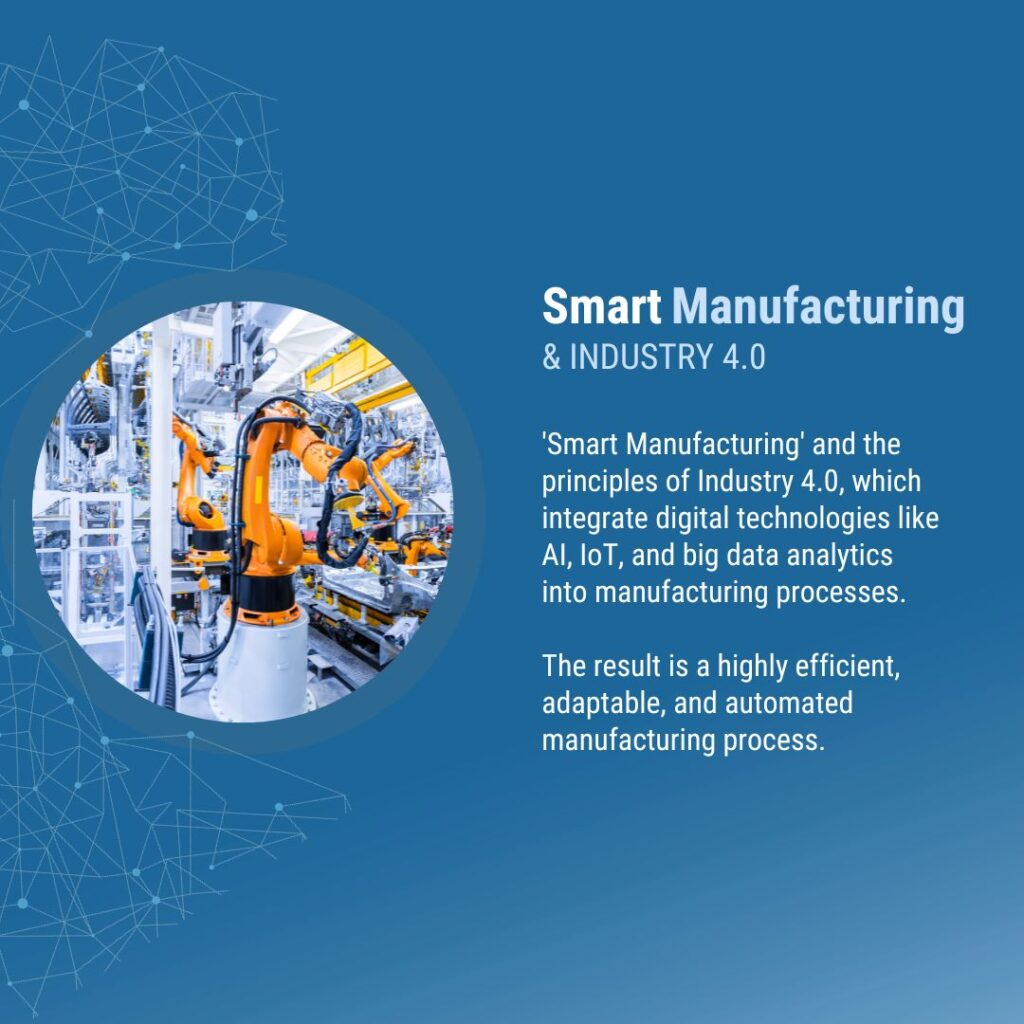
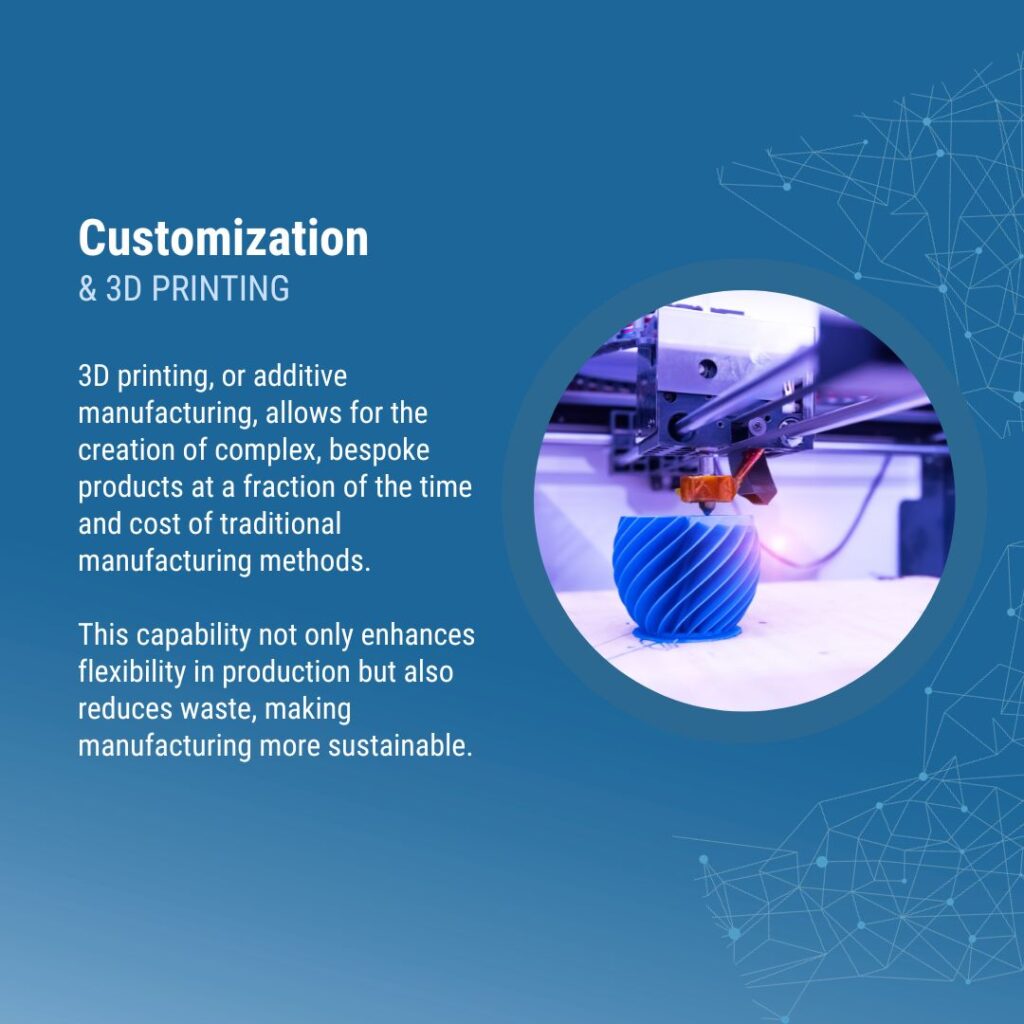
Customization and 3D Printing
A significant trend in modern manufacturing is the shift towards customization and on-demand production, facilitated mainly by advancements in 3D printing technology. 3D printing, or additive manufacturing, allows for the creation of complex, bespoke products at a fraction of the time and cost of traditional manufacturing methods. This capability not only enhances flexibility in production but also reduces waste, making manufacturing more sustainable.
Data-Driven Production Management
Data-driven decision-making is another cornerstone of the manufacturing sector’s digital transformation. The extensive use of sensors and IoT devices generates vast amounts of data, which, when analyzed using advanced data analytics, provides invaluable insights into production processes. These insights enable manufacturers to optimize operations, improve product quality, and reduce downtime. Predictive analytics plays a critical role in anticipating maintenance needs and production bottlenecks, thereby enhancing overall operational efficiency.
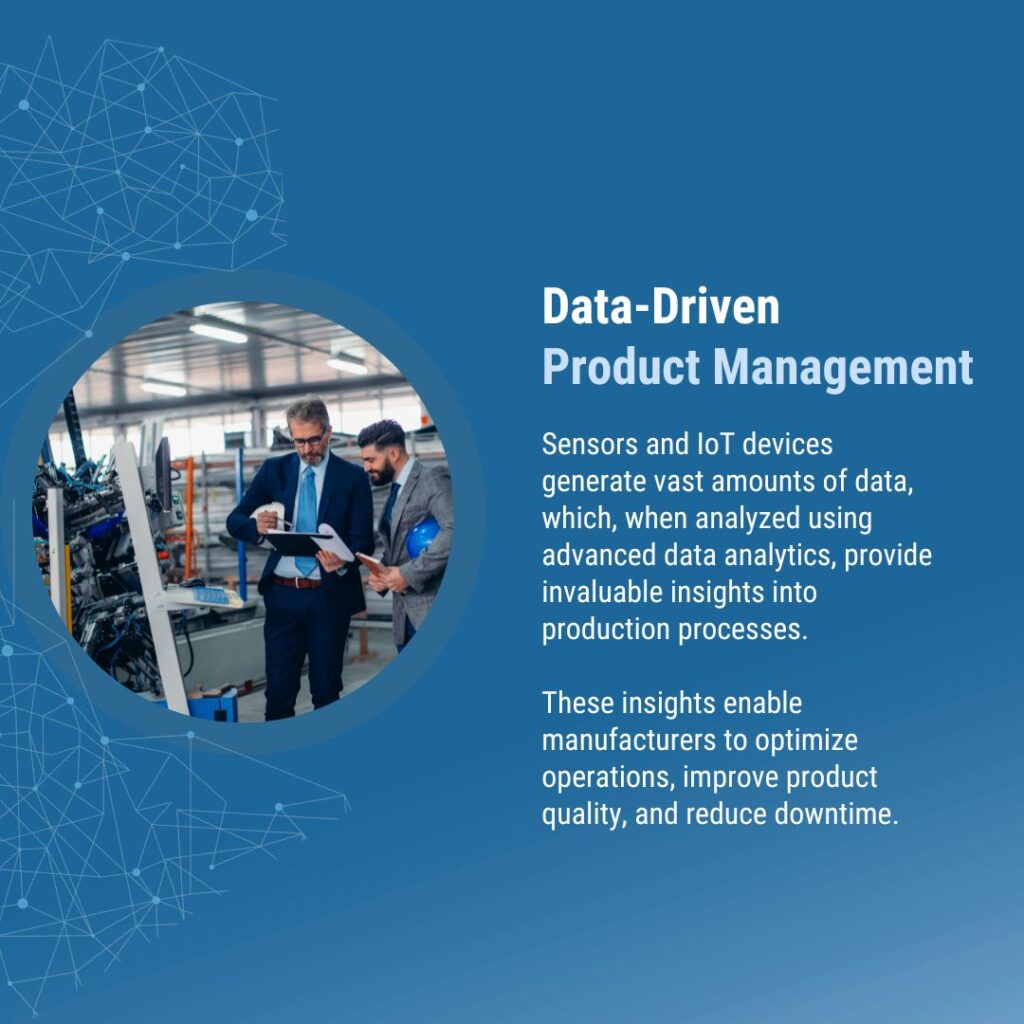
The integration of AI further enhances these capabilities, enabling more accurate and faster analysis of complex data sets, leading to more innovative, more informed decision-making processes in manufacturing. The manufacturing sector in 2024 will be distinguished by a harmonious blend of advanced technologies and innovative practices. This blend is not only revolutionizing how products are designed, produced, and distributed but also redefining the role of human workers, who are now more engaged in high-value tasks, overseeing and complementing automated processes.
Customer Centricity Drives Service Industry DX
Digital Shift in Retail and E-commerce
The retail sector in 2024 is a prime example of DX in the service industry. E-commerce has evolved beyond simple online transactions, becoming a sophisticated digital experience that integrates AI, augmented reality (AR), and personalized marketing strategies. These technologies enable retailers to offer highly customized shopping experiences, from virtual try-ons to AI-driven product recommendations. Additionally, the use of big data analytics in understanding consumer behavior has led to more effective inventory management and targeted marketing campaigns.
Revolutionizing Healthcare through Technology
Healthcare in 2024 is witnessing a paradigm shift driven by digital technologies. Telemedicine has become mainstream, vastly improving access to healthcare services, especially in remote areas. Electronic Health Records (EHRs) are now universal, improving patient care coordination and data management. AI and machine learning are playing a critical role in diagnostic procedures, drug discovery, and personalized treatment plans. Wearable health tech and IoT devices provide continuous patient monitoring, contributing to proactive health management and improved outcomes.
Transformation in Financial Services
The financial services industry is undergoing a significant transformation with the adoption of blockchain for secure transactions, AI for risk assessment and fraud detection, and fintech innovations that are reshaping traditional banking and investment services. Digital currencies and mobile banking have become the norm, providing greater accessibility and convenience to consumers. Robo-advisors are offering personalized investment advice, making financial planning more accessible. Furthermore, regulatory technology (RegTech) is emerging to help financial institutions comply with increasingly complex regulatory requirements more efficiently.
In conclusion, the service industry in 2024 is defined by a profound digital shift, with sectors like retail, healthcare, and financial services leveraging advanced technologies to enhance their offerings, streamline operations, and provide enriched customer experiences. This transformation is not just about adopting recent technologies but also about reimagining traditional service models in the context of a digital-first world.
Navigating Challenges and Concerns in Digital Technologies
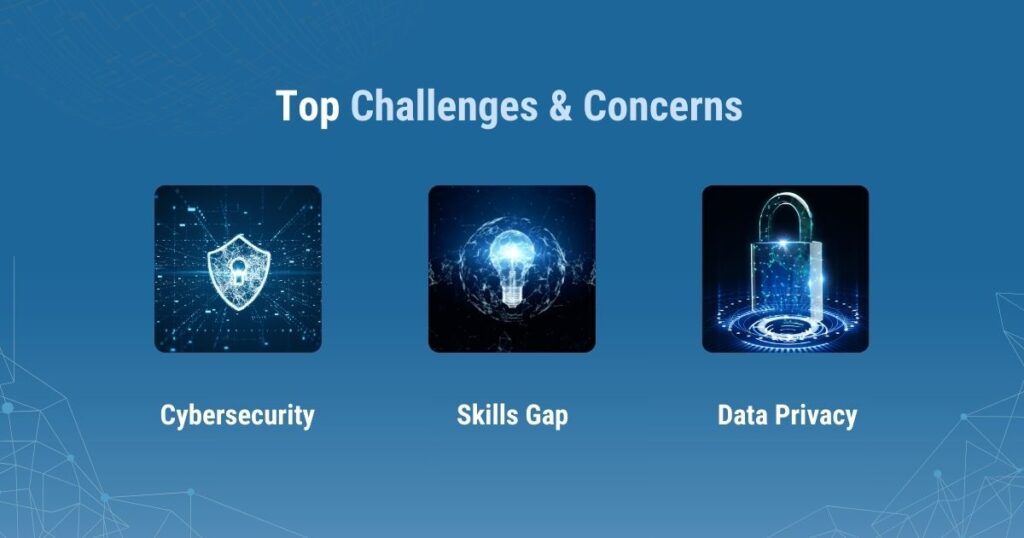
Addressing Cybersecurity Concerns
In 2024, as businesses increasingly rely on digital technologies, cybersecurity emerges as a paramount challenge. The proliferation of data and interconnected systems elevates the risk of cyber threats, making robust security measures essential. Businesses are adopting advanced security technologies like AI-driven threat detection, blockchain for secure transactions, and quantum cryptography to safeguard against sophisticated cyber-attacks. Additionally, there is a growing emphasis on developing a culture of security within organizations, where every employee is aware and trained in best practices for data protection.
Managing Digital Skills Gap
The rise of DX has led to a significant skills gap, as the demand for expertise in emerging technologies outpaces the supply of qualified professionals. To address this, businesses need to invest in training and development programs to improve their workforce. There is also a growing collaboration between industry and educational institutions to develop curricula that reflect the evolving technological landscape. Moreover, the adoption of technologies like AI and automation is not only about replacing human labor but also about augmenting human capabilities, necessitating a redefinition of roles and new skill sets.
Ethical Considerations and Data Privacy
As digital technologies become more ingrained in business operations, ethical considerations and data privacy concerns are increasingly coming to the fore. The use of AI and data analytics, while beneficial, raises questions about bias, transparency, and accountability. Businesses are, therefore, not only implementing strict data privacy policies but also adopting ethical guidelines for AI use. This approach involves ensuring transparency in AI-driven decisions, safeguarding against biases in machine learning algorithms, and ensuring compliance with global data protection regulations like GDPR.
In summary, the challenges of cybersecurity, the skills gap, and ethical considerations are critical aspects of DX in 2024. Addressing these challenges requires a multifaceted approach involving the adoption of advanced technologies, investment in human capital, and a steadfast commitment to ethical practices and data protection.
Looking to the Future: Predictions and Trends for 2024
Looking ahead to the future of DX, several trends are likely to shape the trajectory of this ongoing revolution. The integration of AI across various sectors is expected to deepen, leading to more autonomous and intelligent systems. The expansion of IoT will further embed connectivity into the fabric of daily business operations, enhancing real-time data collection and analysis. Additionally, the evolution of quantum computing holds the potential to solve complex problems at unprecedented speeds, opening new avenues in research and development.
Sustainability is also set to become a central pillar in digital strategies as organizations increasingly recognize the importance of eco-friendly practices. This shift will see the adoption of technologies that promote energy efficiency and reduce carbon footprints.
Preparing for the Next Wave of Innovation
To stay ahead in a rapidly evolving digital landscape, businesses will need to remain agile and adaptable. This preparation involves continuous investment in emerging technologies and fostering a culture of innovation within organizations. Emphasizing constant learning and skill development will be crucial for workforce readiness in the face of new technological advancements.
Collaboration between different sectors and industries is also expected to become more prevalent, as cross-industry partnerships can lead to innovative solutions and foster a more integrated approach to digital transformation.
Long-Term Impact on Global Economy and Society
The long-term impact of DX on the global economy and society is poised to be substantial. Digitally transformed businesses are likely to see increased efficiency, reduced costs, and enhanced competitiveness on a worldwide scale. This transformation is also expected to drive economic growth by creating new markets and job opportunities, although it may simultaneously present challenges in terms of job displacement in specific sectors.
On a societal level, DX has the potential to improve the quality of life through enhanced services, better healthcare, and more personalized experiences. However, it also raises important questions about privacy, data security, and the digital divide. Ensuring equitable access to technology and addressing the socio-economic implications of rapid digitalization will be crucial.
In conclusion, the future of DX will exemplify a blend of exciting technological advancements and significant societal implications. As this journey continues, it will be imperative for businesses and societies to navigate these changes thoughtfully, ensuring that the benefits of DX are realized broadly and responsibly.

Free PDF Download
In the rapidly changing digital landscape, more and more companies are desperately trying to keep up with the competition. Download “The 10 Biggest Mistakes Businesses Make in Digital Transformation” for free today to learn how to use DX to radically transform your business and gain an edge over your competitors.
Digital Transformation: A Strategic Imperative
As we reach the conclusion of our exploration into digital transformation and its broad impact across industries in 2024, several key insights emerge. First and foremost, DX transcends mere technological adoption; it represents a fundamental shift in how businesses operate, innovate, and deliver value. From the integration of AI in decision-making processes to the adoption of IoT for enhanced operational efficiency, the role of technology in driving business evolution is undeniable.
Across different sectors, from manufacturing to services, we’ve seen a consistent trend toward automation, data-driven strategies, and customer-centric approaches. These trends indicate a more significant movement towards a more interconnected, efficient, and responsive business landscape.
Final Thoughts on Embracing Change
As we look toward the future, one thing is clear: the pace of change is not slowing down. Businesses and industries must continue to adapt, innovate, and embrace the opportunities presented by digital technologies. This journey is not without its challenges, including cybersecurity risks, the need for skill development, and ethical considerations around the use of technology.
However, the potential benefits – increased efficiency, enhanced customer experiences, and new avenues for growth – make this journey not just necessary but vital for long-term success. The key to navigating this landscape lies in fostering a culture of continuous learning, ethical technology use, and adaptability.
Digital transformation is not just a technological imperative; it’s a strategic one that requires a holistic approach encompassing people and processes as well as technology. As we move forward, the collaboration between different sectors, investment in human capital, and commitment to sustainable and ethical practices will be crucial in realizing the full potential of this digital era.
Stay Ahead of the Curve
About the Author
Shana Gibbons is the Warehousing and Supply Chain Business Process Consultant. She has over 16 years of experience working in the Supply Chain and Warehousing space, and she is deeply passionate about building relationships with her clients and teams in order to help them navigate through their Warehouse and Supply Chain ups and downs.
